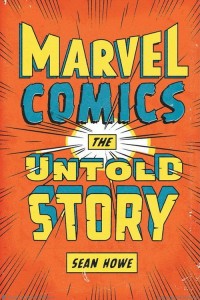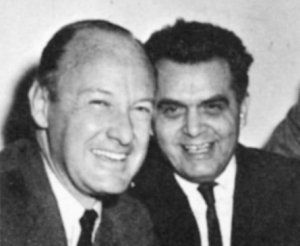Bookworms: Marvel Comics: The Untold Story By Sean Howe
Posted By Dave Howlett on March 6, 2013
Kids weaned on Marvel Comics’ superhero sagas were made to feel like they were part of a cool, secret club, one presided over the “Marvel Bullpen” of creators. These hardworking writers and artists were often given silly nicknames by Marvel’s Editor Emeritus, Publisher Stan Lee, and presented as one big happy family devoted to chronicling the four-color adventures of Spider-Man, the Avengers, the Fantastic Four, and many, many more. The facts behind this fiction–the fabled Bullpen didn’t actually exist (freelancers usually worked from home), and Lee hogged all the glory while his collaborators struggled to feed their families–is well documented by this point, in numerous interviews and in books like Ronin Ro’s Tales To Astonish. But never has the fascinating, heartbreaking saga been told in such entertaining detail as it is in Sean Howe‘s absorbing tell-all, Marvel Comics: The Untold Story, a decades-spanning page-turner that not only pulls back the curtain on the company’s early days, but also sheds light on equally riveting episodes from the more modern Marvel Age.
Howe’s narrative begins with the 1940s and 1950s pre-Marvel eras of Timely and Atlas, which saw struggling creators like Stan Lee and Jack Kirby trying to perfect a formula which wouldn’t pay off until 1961, with the debut of The Fantastic Four. As sales soared and new creations like The Amazing Spider-Man and The Uncanny X-Men took off, Lee and his stable of loyal freelancers like Steve Ditko, Herb Trimpe, and the ever-prolific “King” Kirby became heroes, not only among kids but to an emerging counterculture that saw themselves reflected in tortured, self-doubting protagonists like Peter Parker and Bruce Banner. Howe tells us that Stan “The Man” Lee positioned himself as the face and voice of the company, leading to bitterness and defections among his stable of artists. But Howe also chronicles Lee’s desperate struggle to escape the comics industry as he sought to ingratiate himself in Hollywood–a struggle that wouldn’t fully pay off until the explosion of Marvel movies that began with 2000′s X-Men and culminated in the blockbuster success of 2012′s The Avengers (even now, though, Lee still finds himself relegated to the status of a powerless figurehead, best known for silly cameos alongside his own creations).
None of this is exactly news, which is why it’s so exciting when Howe delves into more recent but equally seedy Marvel episodes; Howe lovingly details the drug use that informed the sensibilities of 1970s creators like Steve Englehart and Jim Starlin, who sought to elevate their readers’ consciousness in books like Dr. Strange and Warlock. Howe also gives special attention to embattled creators like Howard The Duck scribe Steve Gerber and Secret Wars scripter/tyrannical 1980s Editor-In-Chief Jim Shooter, who informed stories with their own brand of pathos (Gerber snuck in plenty of jabs at his corporate overseers, while Shooter liked to spin tales of misunderstood gods beset by their own creations). Marvel’s rollercoaster fortunes nearly went off the rails entirely in the 1990s, Howe tells us, when Marvel’s roster of rock-star talent jumped ship to form Image Comics, and when Wall Street sleazeballs stripped the company of its most valuable assets and left the publisher flailing in bankruptcy. The 21st Century saw Marvel reborn as a billion-dollar movie-property factory, one which still refuses to acknowledge the contributions of essential architects like Kirby and Ditko.
Marvel Comics: The Untold Story unfolds like a grand tragedy, where the only entity to come out ahead is the Marvel brand itself (one heartbreaking chapter near the end details how Lee was hoodwinked into forming Stan Lee Media, only to see it flame out in bankruptcy after producing nothing of any value). Howe fills the saga with juicy trivia–when Shooter’s reign at the company ended, several freelancers burned the Editor-In-Chief in effigy; a Rob Liefeld-spearheaded Captain America relaunch in 1996 is thought to have contributed to longtime Cap scripter Mark Gruenwald’s fatal heart attack; superstar X-Men penciller Jim Lee finally decided to join the Image Comics defection when the famously stingy Marvel wouldn’t pay for his wife’s plane ticket to accompany him to a convention. For comic fans weaned on the “House Of Ideas”, the revelation of just how divided the House really was can be a depressing, demoralizing experience at times, but Howe’s Untold Story rivals famous Marvel storylines like “The Death Of Gwen Stacy” and “The Dark Phoenix Saga” for epic, tragic, comic-book intrigue.




















Comments
Leave a Reply
Please note: Comment moderation is currently enabled so there will be a delay between when you post your comment and when it shows up. Patience is a virtue; there is no need to re-submit your comment.